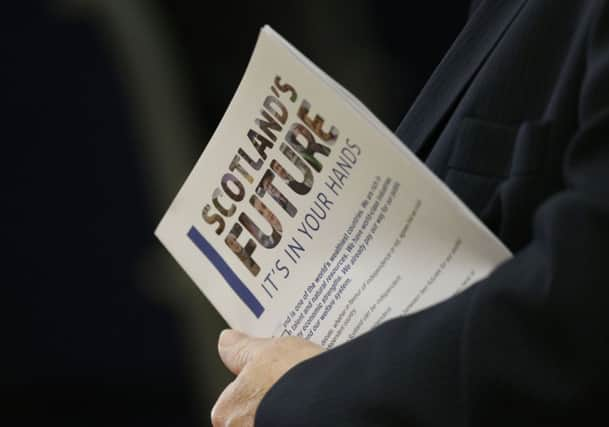Everyday life is the real issue, not media debate


THE Scottish independence referendum is the main topic of conversation across the country, and at ENABLE Scotland we have been talking to our members about it, finding out about their main issues and the questions they need answered. What strikes me most is the contrast between the issues our members are raising, and the issues being covered in the media.
The media debate is dominated by soundbites and by complex political and economic arguments. It is focusing largely on issues such as fluctuating oil revenues, currency union, pensions and European Union membership. These are all issues of exceptional importance, but they are not the issues that are most exercising our members.
Advertisement
Hide AdAdvertisement
Hide AdOur 4,500 members are primarily people who have learning disabilities, and carers. At a recent meeting with 60 of our members, they had very different questions to the ones routinely discussed in the media.
These members of our self-advocacy groups wanted answers to their questions in order to inform their thinking and ultimately their vote.
The big question for our members is not if Scotland can be independent or not, but what independence would mean for the lives of Scotland’s population, including people who have learning disabilities.
Our members wanted to ask about everyday issues that affect their quality of life, and to use the answers to make a judgment about whether things would be better, or not, in an independent Scotland. They wanted to know how a successful Yes or No vote would mean that more people who have learning disabilities could get and keep a paid job, and contribute as equal citizens.
They wanted to know how the significant health inequalities experienced by people who have learning disabilities could be reduced.
And they wanted to know which vote would contribute most to ensuring that fewer people who have learning disabilities have to continue to suffer from the horrific levels of bullying and harassment.
ENABLE Scotland also has an elected body, called Scottish Council, of almost 50 members (people who have learning disabilities and carers) who represent our wider membership within the governance arrangements of our charity. Earlier this month our Scottish Council also discussed the referendum.
Naturally, many of the same issues and questions were raised, with a focus on everyday life. Members of Scottish Council expressed their serious concerns about the impact of welfare reform on the quality of life of people who have learning disabilities, and want to know the implications for this of voting Yes or No.
Advertisement
Hide AdAdvertisement
Hide AdMembers who are parents of young people who have learning disabilities want to know about the prospects for their children. Will social work departments be properly resourced? Will the experiences in education of children and young people who have learning disabilities be improved? How can we change the outcome of recent Scottish research that only one in three people with a learning disability can name a close friend?
Well over half of the ENABLE Scotland members I have talked to have not decided how they will vote. Many feel the Better Together and Yes Scotland campaigns are not doing enough to reach out to them and provide opportunities for their questions to be answered. Many feel marginalised and excluded from the debate and democratic process.
We see a crucial part of our role as being to change this position. With our partners in the Scottish Consortium for Learning Disability, we are conducting surveys with people who have learning disabilities and carers to gather information, to prepare a manifesto. We will invite both campaigns to answer the questions we raise, and to attend a hustings debate to allow our members to hear directly from both sides of the debate. We will also campaign for clear and accessible information.
Given the social isolation experienced by so many people who have learning disabilities, it is heartening to see so many now participating with such enthusiasm and passion in the independence debate. I believe both campaigns have a responsibility to ensure as few people as possible feel marginalised from this process. If this responsibility isn’t enough of a motivation in itself, there are at least 120,000 people who have learning disabilities in Scotland, together with their tens of thousands of carers and families. Can either campaign afford to ignore them?
• Peter Scott is chief executive of ENABLE Scotland
SEE ALSO